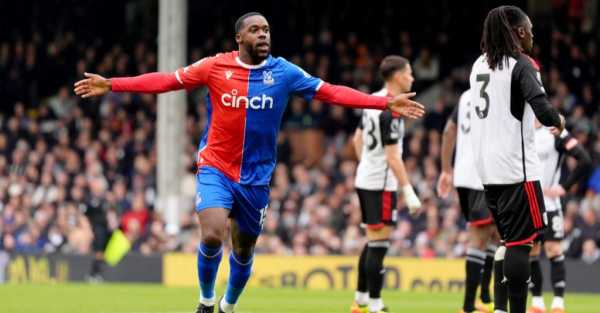
Jeffrey Schlupp scored an 87th-minute wondergoal as Crystal Palace rescued a late 1-1 Premier League draw with Fulham at Craven Cottage.
Marco Silva’s men took a while to get going but they took the lead through Rodrigo Muniz, who took his league tally for the season to nine.
The hosts’ lead was stolen late on after substitute Schlupp stunned them with a goal-of-the-season contender which helped Oliver Glasner’s side take a point in west London.
Palace continued their momentum from their midweek victory over Newcastle through Michael Olise, who had a chance to reward their early efforts.
Adam Wharton slipped the tricky winger through one-on-one but he failed to hit the target when his right-footed shot was scuffed wide.
Palace were without the injured Eberechi Eze but Olise did not seem out of place without his attacking partner when he almost assisted the breakthrough.
Olise used his trusted left foot to whip a wide free-kick onto the head of Chris Richards but the United States defender jumped too early and his close-range header was powered over the crossbar as Fulham avoided another early scare.
The home side had not been at the races and Silva’s animated reactions on the touchline best described their poor first half. But they finally started to get going and they put together a dangerous passage of play on the stroke of half-time.
Joao Palhinha lifted the ball over the top of the Palace defence into the path of the surging Muniz, who held off his markers before Dean Henderson saved the forward’s poked shot from inside the six-yard area.
The Cottagers’ positive end to the first half continued early into the second where they grabbed the opener.
Timothy Castagne’s run blindsided the napping Tyrick Mitchell in behind the right-hand channel before his well-weighted cross was nodded in by the unmarked Muniz at the back post to make it 1-0 after 52 minutes.
Glasner turned to the bench, replacing the inform Jean-Philippe Mateta with Odsonne Edouard, who almost equalised with his first touch.
The target man performed a neat spin on the edge of the area but he was let down by his shot selection when his side-footed effort fell kindly to Bernd Leno.
Palace deserved a goal and they got just that through a moment of magnificence from Schlupp.
The former Ghana international received a powered pass by Wharton before his first touch teed up a thunderous strike which rocketed into the top left-hand corner to level proceedings.
Sourse: breakingnews.ie